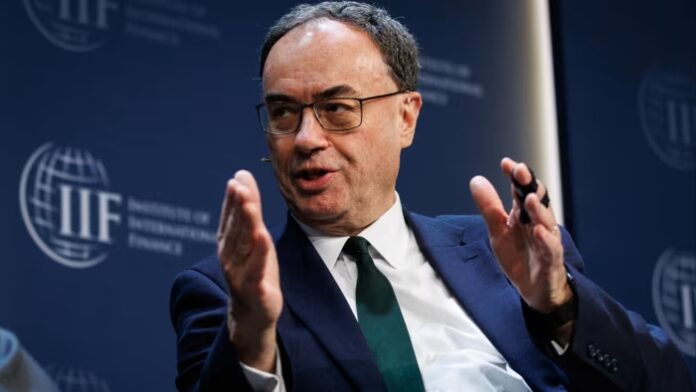Stay informed with free updates
Simply sign up to the Global Economy myFT Digest — delivered directly to your inbox.
Brexit will have a negative impact on the UK economy for the “foreseeable future”, the Bank of England governor has warned, adding that the economy would eventually adapt to Britain’s exit from the EU.
Speaking in Washington, DC, Andrew Bailey said that he took “no position per se” on Brexit, but added that restricted access to trade resulting from the UK’s departure from the bloc would continue to hamper growth.
“If you ask me what the impact is on economic growth, I do have to answer that question as a public official,” Bailey said. “And the answer is that for the foreseeable future it is negative, but over a longer time there should be a positive, albeit partial, counterbalance.”
Bailey was speaking after Rachel Reeves, the chancellor, pointed this week to “severe and long-lasting” effects from Brexit as the Treasury braced for a tough verdict from the Office for Budget Responsibility on the growth outlook in next month’s Budget.
Labour has tried to lower barriers with Brussels in areas such as youth mobility and food and agriculture trade, but analysts have played down the scale of any economic dividends from those efforts.
Bailey was speaking after a week of IMF and World Bank meetings in which central bankers discussed the impact of rising barriers to trade around the world in a period of subdued growth and rising public debt.
On the same panel, European Central Bank president Christine Lagarde rebuked the Trump administration’s punitive tariffs on the EU.
The US president has imposed a 15 per cent levy on almost all imports in a bid to eliminate the trading bloc’s trade surplus with the world’s biggest economy.
Trump believes the trade surplus has allowed EU exporters to profit at the expense of their US counterparts and American jobs.
But Lagarde warned that the US’s “coercive trade measures” would not correct long-standing instabilities in its relationship with the rest of the world, which economists have dubbed “external imbalances”.
Lagarde added that the EU’s trade surplus with other economies — including the UK — was far larger than with the US.
While she said the EU was “a major player in trade”, she added that the bloc was “not a key source of global imbalances and its contribution [to these imbalances] has been steadily declining”.
Kristalina Georgieva, managing director of the IMF, added that while US barriers had increased, retaliation by other countries had been relatively limited.
Bailey pointed to Brexit as one of a number of factors restraining the UK’s growth potential, including its ageing population and Trump’s trade policies.
“The growth model of Adam Smith is clear on this point,” he said. “Make an economy less open and it will restrict growth, though over a longer time trade will adjust and rebuild. And this appears to be what has happened. The same argument holds for the world economy and tariffs.”
Bailey said that the potential growth rate of the UK economy had declined to about 1.5 per over the past 15 years, compared with about 2.5 per cent a year in the preceding 20 years.
He was speaking at a conference of Group of Thirty, a body of financiers and academics.
Bailey also stressed the need to boost investment in areas including AI to counteract the restraints on growth.
He said there was “nothing inconsistent” in believing that AI was the next big technology while being concerned that “it may along the way challenge financial stability through stretched valuations, and particularly in an environment of larger global supply shocks”.
Source link






